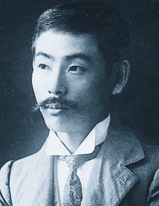Doppo Kunikida
| Doppo Kunikida | |
|---|---|

Doppo Kunikida
|
|
| Born |
15 July 1871 Chōshi, Chiba, Japan |
| Died | 23 June 1908 (aged 36) Chigasaki, Kanagawa, Japan |
| Occupation | Writer and journalist |
| Genre | poetry, short stories, novels, diary |
| Literary movement | Naturalism |
Doppo Kunikida (國木田 獨歩 Kunikida Doppo?, 15 July 1871 – 23 June 1908) was a Japanese author of novels and romantic poetry during the Meiji period, noted as one of the inventors of Japanese naturalism.
Doppo Kunikida was born in Chōshi, Chiba as Tetsuo Kunikida. While some doubt exists as to his biological father, Doppo was raised by his mother and her samurai-class husband. The family moved to Tokyo in 1874, but relocated to Yamaguchi prefecture and Doppo grew up in Iwakuni. The rural area of Chōshū left Doppo with a love of nature and influenced the naturalism which later appeared in his literature. Doppo quit school in order to help support his family in 1888, but left for school in Tokyo in 1889.
He studied at the English department of Tōkyō Senmon Gakkō (now Waseda University). Interested in western democracy, his politically defiant attitude toward the school's administration resulted in his expulsion from the school in 1891. When he was 21 years old, he was baptized by Uemura Masahisa and became a Christian. His religion and the poetry of William Wordsworth influenced his later writing style.
Kunikida founded a literary magazine Seinen bungaku (青年文學 "Literature for Youth") in 1892 and began his private diary Azamukazaru no ki (欺かざるの記 "An Honest Record", published after his death) in 1893, the same year he began teaching English, mathematics, and history in Saiki, another rural area of Japan.
In 1894, he joined the news staff of the Kokumin Shimbun newspaper as a war correspondent. His reports from the front during the First Sino-Japanese War, which were collected and re-published after his death as Aitei Tsushin, (愛弟通信 "Communiques to a Dear Brother") found high favor among the readers.
...
Wikipedia
